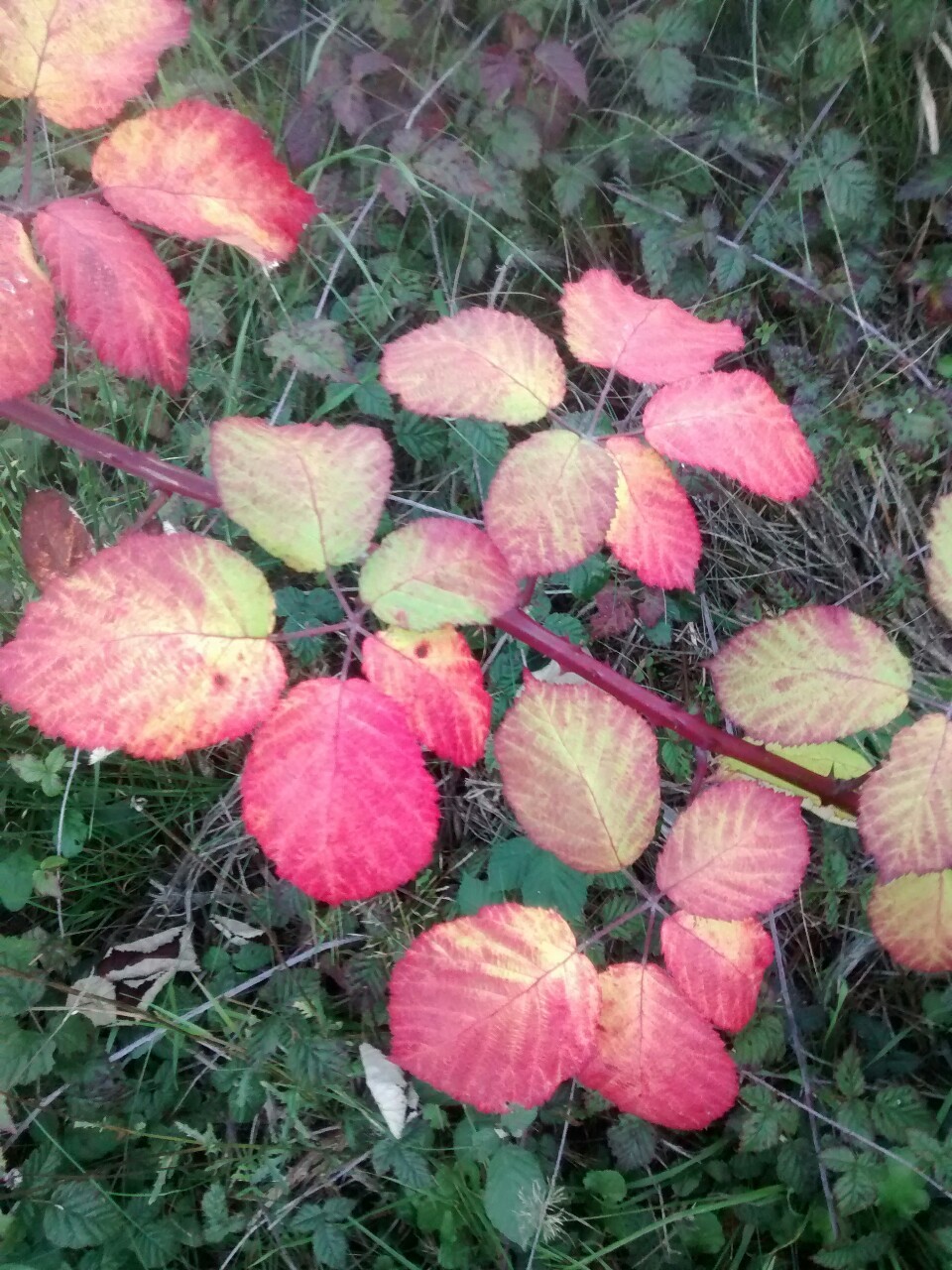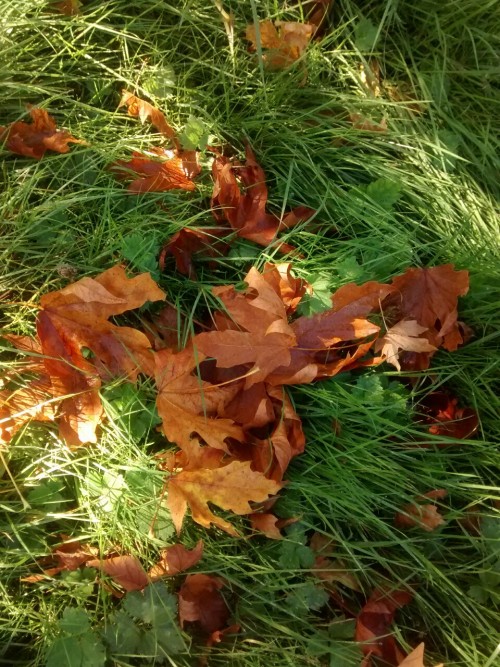It's early October; the days are getting shorter, and the leaves are changing colour. The colours here are a lot more muted than they are back east, but it's still pretty. I had forgotten about fall, not having experienced it in so many years, and I'm rediscovering it.
The maple leaves are changing from green to yellow and brown.
Fallen leaves are collecting on the grass:
"October, crisp, misty, golden October, when the light is sweet and heavy." - Angela Carter, The Magic Toyshop
Halloween is definitely coming; pumpkin spice lattes are advertised outside the coffee shop in town, the drugstore is selling bags of Halloween candy, and there are pumpkins for sale on the roadside outside small farms.
 |
| They're between $8 and $15. Too much for me. |
The hardware store has fancy kale plants for sale. You can actually eat decorative kale, but I don't think people usually do.
 |
| Purple-heart kale. |
The blue hydrangeas outside the church are turning purple with the colder weather:
Most of the landscape is still green, though:
 |
| Three cows in a neighbour's field. |
Someone has grape vines growing on their fence, but the fruit and leaves only start above deer height. I think it's kind of funny:
The fir and cedar trees will stay green all year. Aside from a few sweet gum or Japanese maple trees planted in parks, the only brightly coloured fall foliage you see around here is Himalayan blackberry leaves:
 |
| I'm told blackberry leaves make good tea, but I haven't tried it yet. |
The rosehips on the wild rose bushes that are everywhere along the sides of the roads and along fencelines have turned red too:
 |
| I took this photo on Eid al-Adha morning this year. Shortly after, it started to rain hard. |
Mist hangs over the fields in the early morning:
 |
| I took this photo around 6:30 am, and it was already dissipating. |
O hushed October morning mild,
Thy leaves have ripened to the fall;
Tomorrow’s wind, if it be wild,
Should waste them all.
The crows above the forest call;
Tomorrow they may form and go.
O hushed October morning mild,
Begin the hours of this day slow.
Make the day seem to us less brief.
Hearts not averse to being beguiled,
Beguile us in the way you know.
Release one leaf at break of day;
At noon release another leaf;
One from our trees, one far away.
Retard the sun with gentle mist;
Enchant the land with amethyst.
Slow, slow!
For the grapes’ sake, if they were all,
Whose leaves already are burnt with frost,
Whose clustered fruit must else be lost—
For the grapes’ sake along the wall.
I found my first woolly bear. I must have seen them as a kid, but this one is the first one I can remember:
It's the caterpillar of the Isabella Tiger Moth; I think the caterpillar is a lot more interesting than the adult moth is. Some fuzzy caterpillars are poisonous and will sting you if you touch them, but woolly bears are harmless. They hatch in the fall, and
Wikipedia tells me that they freeze solid in the winter. In spring they thaw out and pupate
. Once it emerges from its pupa as a moth, it has only days to find a mate. Because the summer is so short in the Arctic, up north they can live through as many as fourteen winters before they eat enough to pupate.
There's an old bit of folklore that says that the bands of brown and black on the woolly bear can be used to predict how severe the coming winter will be, but it doesn't look like anyone's been able to demonstrate that it's accurate:
According to folk wisdom, when the brown bands on fall woolly bears
are narrow, it means a harsh winter is coming. The wider the brown band,
the milder the winter will be. Some towns hold annual woolly worm
festivals in the fall, complete with caterpillar races and an official
declaration of the woolly worm's prediction for that winter.
Are
the woolly worm's bands really an accurate way to predict the winter
weather? Dr. C.H. Curran, former curator of insects at the American
Museum of Natural History in New York City, tested the woolly worms'
accuracy in the 1950's. His surveys found an 80% accuracy rate for the
woolly worms' weather predictions.
Other researchers have not been able to replicate the success rate of Curran's caterpillars, though.
Today, entomologists agree that woolly worms are
not accurate predictors of winter weather. Many variables may contribute
to changes in the caterpillar's coloration, including larval stage,
food availability, temperature or moisture during development, age, and
even species. (about.com)
It's getting colder and rains a fair bit, so the cats spend a lot more time indoors, or laying in the sun on afternoons when it's not raining:
 |
| Sitting in the garden reading one chilly afternoon. He was comfortable, but eventually my hands went numb and I had to go back inside. |
 |
| Gracie laying on the garden path. |
Jesse sleeps on my lap all day while I read, and then follows me around the fields meowing at me to pet him. Which I do.
Right before I took this picture he was on the other side of a blackberry bramble yowling like a lost toddler because he couldn't find me, and I had to go get him. Silly cat. He's sitting in a catloaf next to me on the couch right now, huffing because I'm using the laptop and he can't sit on my lap.
The skies are brilliant blue and mostly clear, but I catch some interesting clouds occasionally. It's overcast here, most of the year.
I was reading a passage from Mahmoud Darwish today, and thought it was fitting. This was his last work; he knew he wouldn't live much longer. I think it's his best.
This is your autumn,
opening, spreading the strong scent of exile and empty letters. So fill
them with the yellow, coffee-brown, gold, and copper – nonsynonymous
colors – of leaves that take their time in bidding farewell to the tree
because the wind is absent today. You are so lonesome you do not think
of loneliness. Because you have not bid farewell to anyone since
yesterday, you do not care if your shadow “walks before you or behind
you.” The air is light and the earth seems solid.
And this is not one of the attributes of exile, as they said.
This is your autumn, emerging from a hot summer, from a season of global
fatigue, from a seemingly endless war. An autumn that ripens the
forgotten grapes on high mountains. An autumn that prepares for grand
gatherings where the assembly of old gods reviews drafts of fates still
being written, hammering out a truce between summer and winter. But
autumn in the east is short. It passes like a quick wave from one
traveler on horseback to another, as they pass each other, going in
opposite directions. No one can rely on such an autumn, on dust storms,
or on a temporary marriage.
As for autumn here – the autumn of a Paris returning from its long
vacation – nature, tempted by rain, devotes itself to writing its lush
poems with all of its skill and with the help of aging wine. A long,
long autumn, like a Catholic marriage contract that does not betray its
joy or misery to someone like you, a bystander. A patient autumn. An
erotic embrace of light and shadow, male and female, of a sky that
descends respectfully over trees disrobing with dignity, before the
confusion of temptations between raining drops of light and luminous
drops of water. An autumn showing off. An autumn becoming one with the
beginnings of three seasons: summer’s nudity, winter’s intercourse, and
spring’s youth.
And you, you tread lightly on the surface of this autumn day. You are
invigorated, infatuated, and stunned: “How can anyone die on a day like
this?” You do not know whether you live in autumn or whether it lives in
you, even if you remember that you are in the autumn of life, where
mind and heart master listening to time with a harmonious collusion of
pleasure and wisdom. A noble rhythm raises the body to sense what is
missing, so it is filled all the more with the beauty of cloudlessness
and cloudiness. It prepares itself, like a weather station, to observe
the appropriate weather conditions for a passing conversation: “It’s a
beautiful day, isn’t it? So why don’t we meet for coffee?” The aroma of
coffee has doors that lead to another journey: to friendship, love, or
loss without pain. Coffee moves from the metaphorical to the tangible.
A secret rhythm leads this experience to an absolute sense of departure;
to the encounter between an autumn strolling through squares with the
crowd, people and doves, and your own private autumn, your inner autumn.
You wonder, as someone else has: Are we what we do with time, or are we
what time does with us? Finding a response does not interest you as
much as slowing down time. You do not want this autumn to end, just as
you do not want the poem to grow to fullness and end. You do not want to
reach winter. Let autumn be your private eternity.
| —
| Mahmoud Darwish, ‘In the Presence of Absence,’ Chapter X, translated by Sinan Antoon (2011). |
























